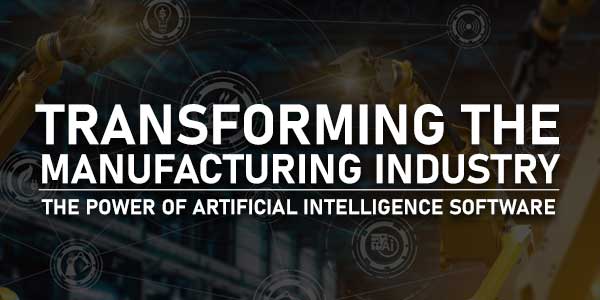
The manufacturing industry has significantly transformed in recent years thanks to the integration of artificial intelligence and machine learning technologies. The introduction of AI software in manufacturing processes has increased efficiency, improved quality control, reduced downtime, and enhanced productivity.
This article delves into how artificial intelligence and machine learning reshape the manufacturing sector. We’ll also explore the role of AI Chatbot Development in streamlining various aspects of this industry.
Table of Contents
Enhanced Predictive Maintenance:
One of the most significant advancements brought about by AI in manufacturing is predictive maintenance. Traditional maintenance often involves scheduled check-ups, leading to unexpected equipment failures and costly downtimes. AI software, however, can predict when machinery is likely to fail by analyzing historical data and real-time performance metrics. This enables manufacturers to perform maintenance tasks only when necessary, reducing operational costs and increasing overall equipment effectiveness (OEE).
AI-driven predictive maintenance systems can monitor equipment health, vibration, temperature, and other critical parameters, providing early warnings for potential issues. When a machine exhibits signs of wear or impending failure, the system can alert maintenance teams, allowing them to intervene before a breakdown occurs. This saves time and money and extends the lifespan of expensive machinery.
Quality Control And Inspection:
The manufacturing industry relies heavily on maintaining high product quality standards. AI software has revolutionized quality control and inspection processes, making them more accurate and efficient. Machine Learning algorithms can be trained to identify defects or anomalies in real-time, often more accurately than human inspectors.
Using computer vision technology, AI-powered systems can detect even the smallest imperfections in products, such as scratches or irregularities in manufacturing. This precision ensures that only products meeting the highest quality standards are sent to market, reducing recalls and minimizing waste. As a result, AI contributes to substantial cost savings and significantly improves product quality.
Supply Chain Optimization:
AI has also played a pivotal role in optimizing supply chain management for manufacturers. Integrating AI software allows companies to gain better visibility into their supply chains and make data-driven decisions to improve efficiency and reduce costs. AI and ML algorithms can predict demand fluctuations, identify potential bottlenecks, and optimize inventory levels, ensuring that raw materials and finished products are available when needed.
Machine Learning models can analyze historical data and real-time information to provide manufacturers with accurate demand forecasts, allowing them to plan production and inventory management accordingly. This proactive approach helps reduce excess inventory, minimize storage costs, and improve supply chain responsiveness.
AI-Powered Chatbots For Customer Support:
Artificial Intelligence and Machine Learning are enhancing manufacturing processes and playing a vital role in improving customer support within the industry. AI Chatbot Development has become increasingly popular to provide quick and efficient customer service, helping manufacturers maintain strong client relationships.
AI-powered chatbots can answer customer queries, address issues, and provide information 24/7. They can assist with order tracking, product inquiries, and technical support, reducing the workload on customer service teams. Manufacturers can allocate human resources to more complex and strategic activities by automating routine tasks.
Moreover, chatbots can also gather valuable customer feedback and data, which manufacturers can use to enhance their products and services. These AI-driven virtual assistants improve customer engagement and satisfaction while reducing response times, making them a valuable addition to any manufacturing business.

Process Optimization And Automation:
AI and Machine Learning technologies are instrumental in optimizing manufacturing processes and automation. Manufacturers can use AI to streamline production lines, reduce errors, and increase productivity. Here are some ways in which AI software is transforming manufacturing processes:
Predictive Analytics:
AI can predict optimal process parameters to achieve the desired product quality, minimizing experimentation and waste.
Robotic Automation:
Robots with AI capabilities can perform repetitive and complex tasks precisely, increasing production efficiency.
Energy Efficiency:
AI can help monitor and manage energy consumption, reducing costs and the environmental impact of manufacturing operations.
Inventory Management:
AI software can optimize inventory levels, reducing excess stock while ensuring that materials are readily available.
Improved Safety And Risk Management:
Safety is a paramount concern in the manufacturing industry. AI software has been a game-changer in improving safety and risk management by identifying potential hazards and preventing accidents. Machine Learning models can analyze data from various sensors and cameras to identify safety breaches and alert operators in real time.
Additionally, AI can enhance risk assessment by analyzing historical safety data and identifying patterns that may lead to accidents or safety incidents. By providing proactive insights, AI contributes to a safer working environment, ultimately reducing workplace injuries and associated costs.
Customized Production:
With the rise of Industry 4.0, manufacturers are increasingly adopting AI and Machine Learning for customized production. The ability to offer customized products at scale is a significant advantage, as it meets the growing demand for personalized items and caters to individual customer preferences.
AI-driven systems can optimize production lines to accommodate the specific requirements of each product variant. This customization satisfies customer needs and enables manufacturers to adapt to changing market trends more efficiently.
Reducing Environmental Impact:
Manufacturers are under increasing pressure to minimize their environmental footprint. AI software is aiding in this endeavor by optimizing operations and reducing waste. For instance, AI can optimize supply chain logistics to minimize fuel consumption and reduce greenhouse gas emissions. It can also help manufacturers track and reduce their overall energy consumption through predictive analytics and real-time monitoring.
By enhancing the efficiency of manufacturing processes, AI contributes to sustainability efforts, aligning with global environmental goals.
Real-Time Data Analysis And Decision Support:
One of the core strengths of AI is its ability to process vast amounts of data in real-time. In the manufacturing industry, real-time data analysis is crucial for making informed decisions quickly. Machine Learning models can analyze data from sensors, production lines, and supply chains, providing actionable insights to operators and decision-makers.
With access to real-time data, manufacturers can adapt to changing conditions and adjust their production processes, ensuring optimal performance. This capability is particularly valuable in industries with high variability and dynamic market conditions.
Conclusion:
Artificial Intelligence Software and Machine Learning are revolutionizing the manufacturing industry, offering many benefits, from predictive maintenance and quality control to supply chain optimization and customized production. The integration of AI Chatbot Development also enhances customer support and engagement.
As manufacturers adopt AI technologies, they experience increased efficiency, reduced costs, and improved product quality. Moreover, AI’s contribution to environmental sustainability and safety cannot be understated. In the coming years, AI will undoubtedly play a more prominent role in shaping the future of manufacturing, making it more agile, competitive, and environmentally responsible.
The manufacturing industry is on the cusp of a new era, where the convergence of AI and manufacturing processes will unlock even more possibilities. Companies that embrace these technologies will be well-positioned to thrive in the fast-evolving landscape of modern manufacturing.

 About the Author:
About the Author:












Be the first to write a comment.